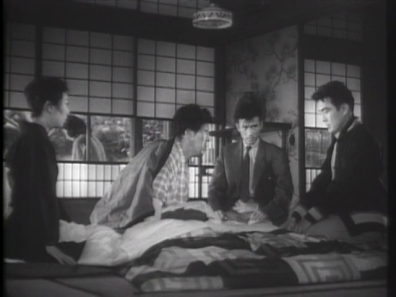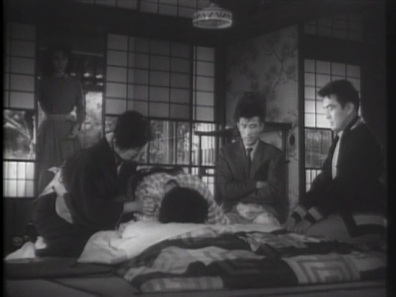Kobayashi Masaki’s I Will Buy You is a baseball drama that focuses on talent scouting as a metaphor for the ruthlessness of post-war capitalism. The drama unfolds swiftly, packing a lot of plot into its two hours, hurried almost to a fault. But it also manages to cover a lot of ground, creating a complex and nuanced portrait of the cruelty and greed of this new economic reality. It’s a cynical film, but it maintains a humanist soul. Kobayashi cares deeply for his characters, even as they tear each other apart. In this world, integrity is a prize won through severe hardship.
I Will Buy You stars Sada Keiji, an actor who quickly rose to fame during the fifties and was tragically killed in a car accident at the height of his career, at the age of 37. His role in this film garnered him two Best Actor awards. It’s a good performance, but that’s often despite the script, which is uneven in its dramatic development and saddles him with a lot of expository dialogue. Sada plays the talent scout, Kishimoto. Ôki Minoru plays Kurita Gorô, the prize hitter Kishimoto wants to sign, along with every other major team. The film also stars Kishi Keiko (Kobayashi fans will remember her as Yuki in Kwaidan) as Fueko, Kurita’s love interest, and Ito Yunosuke as Kyuki, the man who helps raise Kurita and teaches him baseball, and whom the talent scouts must win over if they want to win Kurita.
Kishimoto is the heart and soul of the film. His increasing disillusionment with his profession dovetails with the film’s scathing indictments. His journey offsets the film’s cynicism to a degree, as it maintains the possibility for moral integrity and genuine empathy in the face of corrupt and unethical business practices, which one character explicitly compares to human trafficking later in the film. His internal dilemma, however, is often expressed outwardly with some poorly written drama, scenes that are overly melodramatic and saddled with insipid and expository dialogue. These scenes often function to signpost character emotions and explain the film’s themes. The frequent outpouring of emotion also feels naive in the context of the plot’s byzantine ruthlessness, and the fact it is rarely exploited makes the film almost shockingly optimistic.
Kobayashi generally directs these scenes well, maintaining a sharp visual sense and good rhythm. But he cannot fix the structural problems inherent in the screenplay. Kishimoto also provides regular voice-over narration, framed as work notes addressed to his boss, in which he describes events as they are happening and explains the character traits of the various people he meets and what he will have to do to win them over to his cause (i.e. advance the plot). It’s nothing more than a cheap storytelling device, ensuring audiences are keeping up with the dense plot and large cast of characters; it never builds to anything, or adds anything meaningful to the story, beyond (often redundant) exposition. It’s no surprise that a film with so much plot feels the need to signpost, but Matsuyama Zenzô’s script overcompensates to the detriment of its drama.
Nor does it help that so many plot details are superfluous. A subplot about Kyuki being a former Chinese spy, for example, is basically a red herring; it is quickly forgotten, and does not meaningfully impact our understanding of the character. However, there is a more charitable reading. Given the nature of their work, the fact that Kishimoto and Kyuki spend so much time distrusting each other is a necessary tactic and provides one of the film’s criticisms: in this business, people are forced to assume the worst in each other. Of course, accusations of treason are gravely serious, and the fact that the film introduces such political topics and simply does not have time to explore them any further is mildly frustrating at best. The film simply has too many moving pieces for its own good.
I always say a good ending can go a long way, and that’s true of I Will Buy You. Despite the reservations I have with the film, all of its moving pieces are arranged in such a way to execute a searing conclusion. It builds to a knockout ending with a simple but memorable closing shot. The true nature of one particular character is finally revealed, and it’s a slow realization that earns the film’s cynical reputation. It’s the ultimate “I got mine” plot twist. This does, however, make a subplot involving Kurita’s brothers turning on each other and eventually trying to kill each other feel redundant. Greed makes monsters of us all, but this transformation is obvious and cartoonish and lacks the soul-shattering cynicism of the surrounding scenes.
Also, despite my reservations, I Will Buy You is an engaging film. Matsuyama still manages a nuanced exploration of his themes and Kobayashi directs the action with an assured hand. There is a shot near the end with characters individually framed within doorways, or between support columns, that anticipates the rigorously angular, geometric visuals seen in films like Samurai Rebellion. The shot employs multiple visual planes and frames within frames, with characters moving through spaces in the foreground and background, emphasizing emotional distance. This style is also evident in the two shots below.
Here, the geometric patterns of the interior space create visual boundaries between each character. Kurita, fittingly, is framed in a doorway, set against the backdrop of the next room on the right; throughout the film, he is physically present in scenes while his mind is elsewhere. Most strikingly, Fueko sits outside of this space, seen through the window on the left, and never crosses over into the room, but stands at the boundary. Fueko has no direct role in this drama; the other characters are locked in a struggle with each other, each hoping to secure their futures, but Fueko is always outside, observing them and judging them, seeing through their duplicitous machinations.
This style is evident throughout I Will Buy You, if not as developed or pronounced as in Kobayashi’s later films. But that’s what makes the film of particular interest for Kobayashi fans. It’s a strong early effort, a notable stepping stone in his dramas and the overall development of his aesthetic, which will soon result in his most celebrated films of the sixties. I Will Buy You, which was released in 1956, is not as good as the films that will follow, but it’s worth seeking out.


